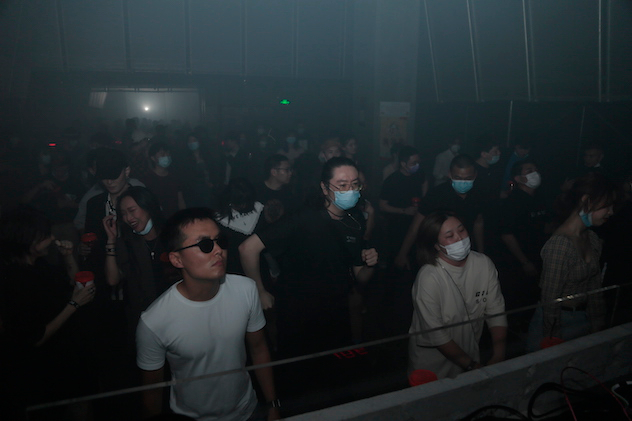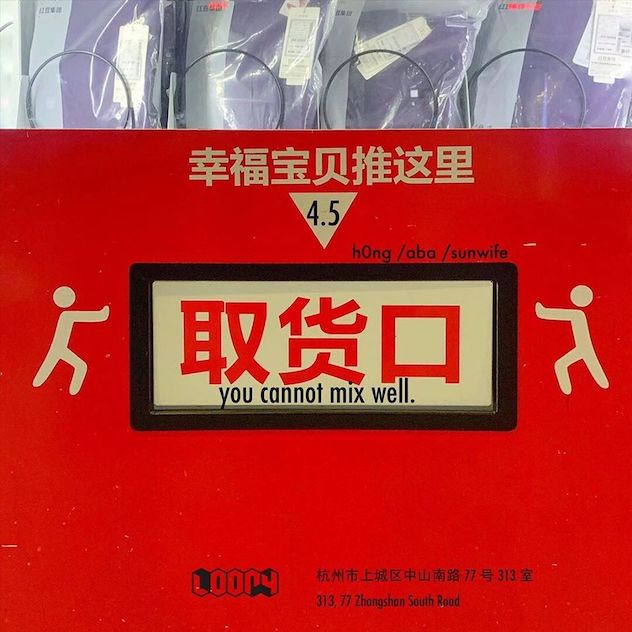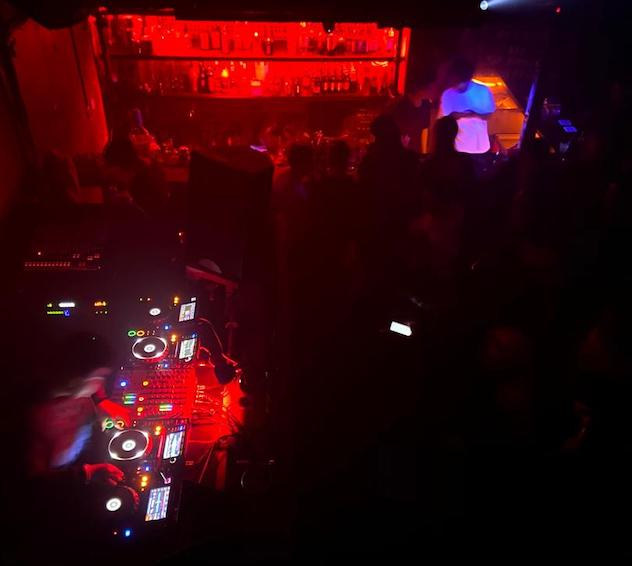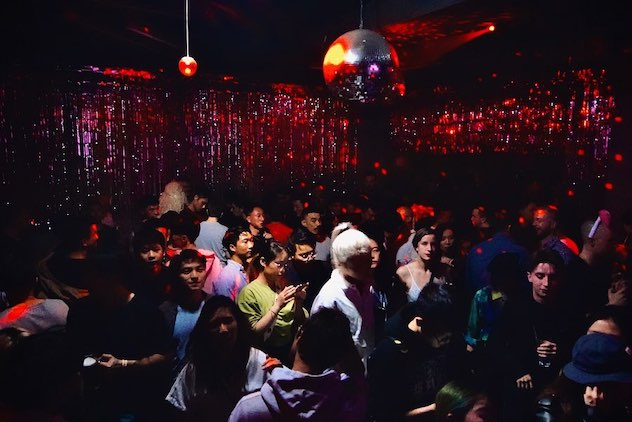Cautious optimism in China as nightlife resumes after lockdown
- GepubliceerdFri, Apr 24, 2020, 12:25
- Woorden
- Delen
- Scenes in cities like Chengdu, Shanghai and Shenzhen have been at a standstill since the start of the year from the coronavirus pandemic. Nyshka Chandran finds out how they're recovering.
- "The music felt like a vibration, filling the air around us, like a warm hug." Kristen Ng, who makes music as Kaishandao in China's southwestern city of Chengdu, is describing a moment that ravers across the world are waiting for: her first night out post-lockdown. "It was incredibly moving and surreal not only to see friends again after so long, but to hear music on a soundsystem and dance together. Emotions were high." An unprecedented period of uncertainty and anxiety has come to an end in China as life in most parts of the country resumes in the wake of the coronavirus pandemic, AKA COVID-19. Over the past month, several provinces have lifted movement restrictions amid sharp declines in the number of locally transmitted infections. Hubei, where the outbreak began, ended its lockdown on April 8th after new infections dropped to zero on March 19th. Officially, 83,000 cases have been reported nationwide, though researchers believe the actual number is much higher. Businesses have reopened their doors, but a return to normalcy remains far off. For nightclubs that have been closed since late January, reopening to the public has brought with it cautious optimism.At OIL Club in Shenzhen, a city that borders Hong Kong, crowd turnout is on the low side because some people are still afraid to go out, cofounders Yangyang Song and Huiyuan Sun told Resident Advisor. "Many people aren't willing to stay late for parties now, so events also end earlier than before," they said. OIL opened to the public on March 27th, the same day as several other venues including TAG in Chengdu and Loopy in Hangzhou.
 OIL Club reopening (See also: lead photo)"At this point, we still can't pay our crew their entire salary, but they understand, our team has been very loyal," Song and Sun said. To stay afloat during lockdown, the club started Far Radio in February and sold drink vouchers and bottle openers. At TAG, "around 10 to 15 percent of our customers are still hesitant to come out," according to club booker Aymen Hajlaoui. "I can't say for sure that we can recoup our losses, but if it continues like this, the outlook doesn't look bad." "I didn't think we could reopen until the end of April, so to do it by the end of March, the time of our six-year anniversary, was really special," Hajlaoui said. Before the epidemic, TAG's birthday was initially planned as a three-day event, but with restrictions loosened in the week leading up to it, the club celebrated by collaborating with Chengdu Community Radio for a small party. The radio platform was launched last year by Hajlaoui and Kristen Ng.
OIL Club reopening (See also: lead photo)"At this point, we still can't pay our crew their entire salary, but they understand, our team has been very loyal," Song and Sun said. To stay afloat during lockdown, the club started Far Radio in February and sold drink vouchers and bottle openers. At TAG, "around 10 to 15 percent of our customers are still hesitant to come out," according to club booker Aymen Hajlaoui. "I can't say for sure that we can recoup our losses, but if it continues like this, the outlook doesn't look bad." "I didn't think we could reopen until the end of April, so to do it by the end of March, the time of our six-year anniversary, was really special," Hajlaoui said. Before the epidemic, TAG's birthday was initially planned as a three-day event, but with restrictions loosened in the week leading up to it, the club celebrated by collaborating with Chengdu Community Radio for a small party. The radio platform was launched last year by Hajlaoui and Kristen Ng. Loopy reopening flyerOther clubs in Chengdu, such as Cue and AXIS, are also back at it, but many venues have been asked to remain closed by authorities due to their location or capacity, according to Ng. "Live venues haven't been given the green light yet, which means band gigs are still on hold," she said. Venues in Shanghai were among the nation's first to open, with hotspots 44KW and Elevator welcoming ravers on March 12th and 20th, respectively. The city was one of the lesser-affected regions by the pandemic, though residents remain careful. Daily Vinyl, an appointment-only record store-cum-guesthouse, isn't seeing as many walk-ins as before, but cofounder Endy Chen believes that will change as people take time to adjust. Chen, who also runs the labels Eating Music and Groove Bunny Records, is set to play at Elevator's fourth anniversary on May 1st and anticipates a solid turnout.
Loopy reopening flyerOther clubs in Chengdu, such as Cue and AXIS, are also back at it, but many venues have been asked to remain closed by authorities due to their location or capacity, according to Ng. "Live venues haven't been given the green light yet, which means band gigs are still on hold," she said. Venues in Shanghai were among the nation's first to open, with hotspots 44KW and Elevator welcoming ravers on March 12th and 20th, respectively. The city was one of the lesser-affected regions by the pandemic, though residents remain careful. Daily Vinyl, an appointment-only record store-cum-guesthouse, isn't seeing as many walk-ins as before, but cofounder Endy Chen believes that will change as people take time to adjust. Chen, who also runs the labels Eating Music and Groove Bunny Records, is set to play at Elevator's fourth anniversary on May 1st and anticipates a solid turnout. TAG reopeningClubs are taking every safety precaution possible, including regular cleaning and disinfecting dance floors. Before entering spaces, people undergo mandatory temperature checks and scan a QR code on their phones that indicates their health status. Once inside, many keep their masks on. Even as the majority in China return to work, some areas still have firm rules in place. In Beijing, anyone arriving from other parts of the country is required to follow a 14-day quarantine. "It's pretty strict in Beijing now," said Zhao Dai resident Slowcook, who is currently in quarantine. "I'm not sure when Zhao Dai will open, going out sounds so far away for me especially as I'm not even able to go downstairs," she said.
TAG reopeningClubs are taking every safety precaution possible, including regular cleaning and disinfecting dance floors. Before entering spaces, people undergo mandatory temperature checks and scan a QR code on their phones that indicates their health status. Once inside, many keep their masks on. Even as the majority in China return to work, some areas still have firm rules in place. In Beijing, anyone arriving from other parts of the country is required to follow a 14-day quarantine. "It's pretty strict in Beijing now," said Zhao Dai resident Slowcook, who is currently in quarantine. "I'm not sure when Zhao Dai will open, going out sounds so far away for me especially as I'm not even able to go downstairs," she said. Elevator reopeningChina's government has formally suspended the entry of most foreigners to prevent a second wave of infections, which means international acts won't be booked anytime soon—even those with valid residence permits or visas can't enter. But many have pointed out hidden silver linings to the current situation. The lack of overseas artists is "a good opportunity to make the local community stronger and for newer DJs to grow," Daily Vinyl's Chen said. "Lineups are 100 percent local these days, and that's great," echoed Ng in Chengdu. "DJs who would never get to play peak time in main rooms are now getting their chance. International booking cancellations has meant club rosters are filling their weekends with fresh local faces." As Chinese nightlife slowly gets its groove back, hopes are afloat for music communities to resurface stronger than ever. Ng said, "People have been practicing their art, resting and now gradually beginning to perform to thirsty crowds with renewed energy." Read more / Coronavirus scare forces mass cancellation of festivals and parties across Asia
Elevator reopeningChina's government has formally suspended the entry of most foreigners to prevent a second wave of infections, which means international acts won't be booked anytime soon—even those with valid residence permits or visas can't enter. But many have pointed out hidden silver linings to the current situation. The lack of overseas artists is "a good opportunity to make the local community stronger and for newer DJs to grow," Daily Vinyl's Chen said. "Lineups are 100 percent local these days, and that's great," echoed Ng in Chengdu. "DJs who would never get to play peak time in main rooms are now getting their chance. International booking cancellations has meant club rosters are filling their weekends with fresh local faces." As Chinese nightlife slowly gets its groove back, hopes are afloat for music communities to resurface stronger than ever. Ng said, "People have been practicing their art, resting and now gradually beginning to perform to thirsty crowds with renewed energy." Read more / Coronavirus scare forces mass cancellation of festivals and parties across Asia Elevator reopening
Elevator reopening - Fri, Mar 20, 2020
Elevator is Open for Dancing
J.R.G.
- Sat, Mar 21, 2020
Elevator is Open for Dancing
OFFSKII, Michael Cignarale
- Fri, Mar 27, 2020
44kw 雷乃发声 Pres. Punk
Max Shen, peyotl
- Fri, Mar 27, 2020
重启派对 Unlock Party (Part-1)
3ASiC, Daniel Power, Warmchainss, XHANKONKON, XHANKONKON
- Sat, Mar 28, 2020
重启派对.2 Unlock Party (Part-2)
Sulk, Yangyang
- Sat, Mar 28, 2020
44kw 月空鸣吠 Pres. FAR Infinity
MIIIA, peyotl
- Fri, Apr 3, 2020
D1sc0v3rment Yangcun Bone Fire Ball
Meguru
- Sat, Apr 4, 2020
Underground Union Label Night
Viyee, Funkie
- Sat, Apr 4, 2020
Byebyedisco Pres. Fantastic Man
Fantastic Man, Pei, Aled
- Sat, Apr 4, 2020
EQ111 (Meditation/ Guiyang)
EQ111
- Thu, Apr 9, 2020
Axis* Re-Open 20/20
Bchir, SilkBoi, Wu Zhuoling
- Fri, Apr 10, 2020
Lab Music presents: Meditation
Li Yuxiang, Sun Xuan, Wu Peng, HAL
- Fri, Apr 10, 2020
TURMOIL Night
Warmchainss, XHANKONKON, XHANKONKON
- Sat, Apr 11, 2020
Silicon Kure 2 Year Anniversary
MIIIA, Yangyang, mingo
- Fri, Apr 17, 2020
Axis* 头颅不滚到爱人脚边,便是肩上的负担
Tutu
- Fri, Apr 17, 2020
Surreal Program 深圳站 @OIL
- Sat, Apr 18, 2020
Hoodoo: Tom Long - Hold it Down
Sulk
- Sat, Apr 18, 2020
LINEOUT with Feel & Akkoii & Kchen
akkoii
- Sat, Apr 18, 2020
Axis* Functionlab 3rd Anniv Mini Tour
GG Lobster, Juan Plus One
- Fri, Apr 24, 2020
Axis*:Preme presents - Surreal Program成都站
Warlock
- Fri, Apr 24, 2020
UNCHAINED - Shenzhen Bass
Daniel Power
- Sat, Apr 25, 2020
OIL Soundsystem All Night Long
- Sat, Apr 25, 2020
Axis* Your Friend La Musique ON Line
Luna LI
- Sat, Apr 25, 2020
Axis* Your Friend La Musique are Already Online
Luna LI
- Thu, Apr 30, 2020
Sam Lai All Night Long
- Fri, May 1, 2020
Osheyack 'Memory Hirerarchy' Release Party
Osheyack, Sulk, XHANKONKON
- Sat, May 2, 2020
地下宫殿15周年「只争朝夕」
- Mon, May 4, 2020
Couch Co-Op Vol.7 五四青年节跳舞音乐文艺汇演: 专治佛、丧、颓系青年
- Wed, Jun 24, 2020
Meditation Showcase:
Li Yuxiang, EQ111